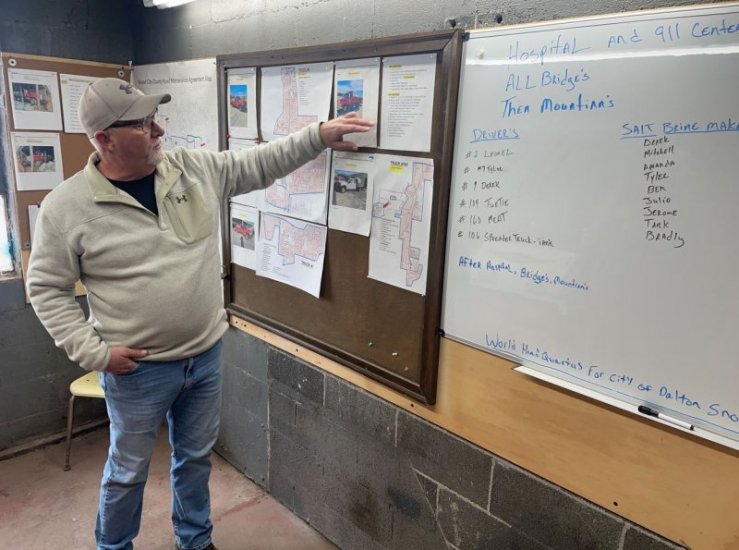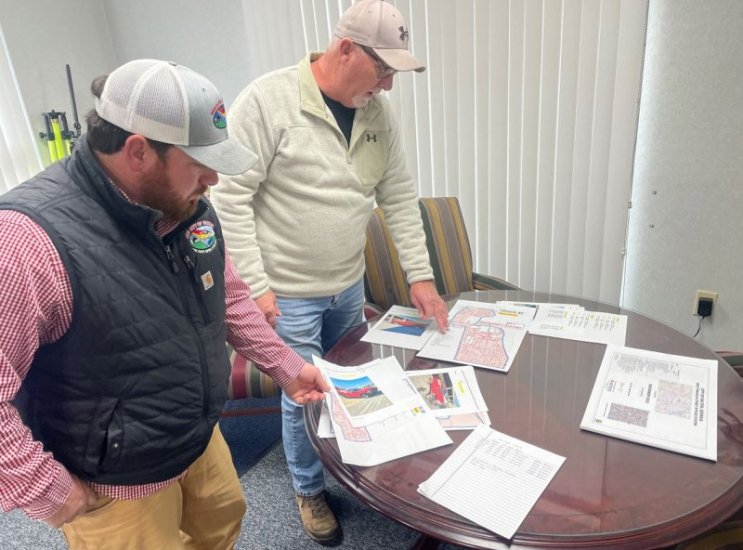"You Can't Let People Down Around Here" - Public Works Manager Fine Tunes Storm Response
 Friday, January 19th, 2024
Friday, January 19th, 2024
When weather forecasts first started to hint weeks ago of the possibility of snow and ice in Dalton, the plan was already in place for the City Public Works Department to respond. The City has had a salt brine operation to keep Dalton's roads clear and safe for many years, but it has become much more detail-oriented in recent years.
Putting The Plan On Paper
Dalton's salt brine operation was first put together by the Public Works Department more than a decade ago. Former operations manager Maurice "Reece" Carroll and his crew built a "homemade" system to make the salt water mixture and also retrofitted trucks to spread it on City roads. The saline solution can prevent the formation of ice on treated roadways. Once ice does form, or in snow events where snow or ice do accumulate on the road, the brine keeps it from bonding with the pavement which makes it easier for plows to clear the roadway.
Caption: Dalton Public Works operations director Greg Holcomb studies salt brine truck routes in the department's "ice situation room"
Carroll retired two years ago, however, and when he and some of his fellow Public Works employees left for retirement they took a lot of institutional knowledge with them.
"Reece and the other guys had been here for so long, they knew the City like the back of their hands," said Greg Holcomb, who followed Carroll as operations manager. "So they just knew where to go and what to do (to treat the roads)."
When Holcomb took over two years ago, he set out to put plans down on paper not just for winter weather but also for other weather emergencies where Public Works would be called in to respond. For the salt brine operation, Holcomb divided the City map into districts and assigned a truck to each one. From there, he developed specific routes for each truck to follow to ensure that all City streets were treated, first with primary roadways, then secondary roads, and then residential streets.
"Before, the problem we always ran into was, we’d say, ‘go to Emery Street.’ And then we'd turn right around and someone else has come back in and they’d say, ‘well I just got through with Emery Street.’ And we'd have someone going back over to do that area again," Holcomb explained. "I just wanted everything organized where there’s nobody going over the same area twice and nobody has to be told where to go."
Holcomb also organized employees into different storm response teams. The larger the event, the more teams are called in. And employees are put on call so they can respond quickly when needed.
"You can’t let people down around here," Holcomb said. "The City has done it for so many years, and we do it basically the same way, we just keep our drivers more organized with plans and things like that with all of the new guys we’ve got. It’s something that we’ve always taken pride in."
 Calling The Shots
Calling The Shots
The best laid plans can still go bad when the forecast changes. Snow and ice events in the Dalton area often include rain before the wintry precipitation begins, and that can cause headaches for the Public Works Department. Rain can wash away the salt brine and leave roads exposed for snow and ice. Over the weekend, rain started about and hour and a half into the salt brine application, and crews had to stop working and then start back from scratch after the rain stopped.
Caption: Public Works director Chad Townsend (left) and Greg Holcomb study the routes for the City's salt brine trucks
"We check the forecast a lot, and then the past few days we were checking it every hour because it kept changing." Holcomb said. "Even with as organized as we’ve got it, it’s still a lot of common sense as far as when to stop, when to start back, when to take chances and hope it’s not going to rain."
Holcomb and his crews keep track of the weather and the progress of each salt brine truck in a sort of "ice situation room" set up adjacent to the salt brine tanks at the Public Works garage. From there, he and his team keep track of each team's progress and direct extra help as needed.
"We have been in situations over the years where we have gotten behind and had to catch up with the ice and it makes it hard even for our trucks to get through it," Holcomb said. "We can salt brine the City in about five and a half hours if we don’t have any trouble. That’s still a big 'if' because you’re still having to watch the weather and make sure rain isn’t coming in. If everything goes well we can go through it in less than six hours.
Public Works crews worked throughout the night Sunday and Monday to keep the streets treated and the effort yielded roadways clear of ice.
Taking Pride In Dalton
Holcomb worked in road construction for more than 20 years before joining the Public Works Department. He bought his father's construction company when he was 20 years old. After selling the business 11 years ago, Holcomb came to work for the City of Dalton.
"The way I ran my company, it was always 6 and 7 days a week, 12 and 15 hours a day, and when I came here I was surprised - because I’d heard all my life about how the government works - but I was really surprised by how hard the guys here in the City work," Holcomb said. "They take pride in Dalton... the best part of the job is just working with these men. The City’s got a really great group of men."
Holcomb points to the wide range of capabilities and experience that the Public Works Department's staff has to offer. The department's versatility often allows the City to carry out projects such as construction or demolition on its own.
"That’s one of the things that really surprised me when I came here was, really, how many different things that they can actually do," Holcomb said. "Whether it’s build buildings, we tear down a lot of buildings... since I’ve been here, I can’t think of one thing that we’ve not been able to do."
As more of the Public Works staff nears retirement, Holcomb is doing more than just putting plans on paper. He's also working with Public Works director Chad Townsend to develop and train younger talent to learn from the older hands.
"Our foremen, we really hate to see some of them retire because they’re such a big part of this," he said. "Chad and I, we try to put our heads together about bringing the younger guys that we’re training to take over one day but that’s not an easy task to try someone to put in a foreman position. It’s not easy."
Whether it's looking toward the future of the department or just next week's weather forecast, Greg Holcomb is working on Dalton's plan.
